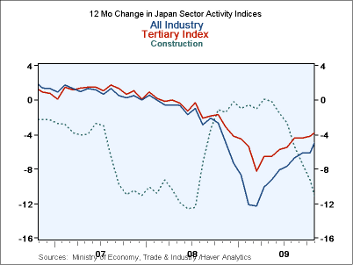 Global| Jun 21 2010
Global| Jun 21 2010Japan Sector Indices Show Improvement-Except Construction
Summary
Japan's all Industries Index rose today by 1.8% a bit less than expected but the strongest rise in several months. This move jolts the all industries index up to the 42nd percentile of its range, a sharp improvement from the 29th [...]
 Japan's all Industries Index rose today by 1.8% a bit less than
expected but the strongest rise in several months. This move jolts the
all industries index up to the 42nd percentile of its range, a sharp
improvement from the 29th percentile where it languished last month.
The industrial reading has moved up to reside in the 63rd percentile of
its range the tertiary index made a strong move this month but still
only perches in the 35th range percentile. Still, that is a sharp
improvement from the 13th percentile reading from one month ago.
Japan's sector indices have made some sharp moves in the past month but
still emit some pretty low-grade signals.
Japan's all Industries Index rose today by 1.8% a bit less than
expected but the strongest rise in several months. This move jolts the
all industries index up to the 42nd percentile of its range, a sharp
improvement from the 29th percentile where it languished last month.
The industrial reading has moved up to reside in the 63rd percentile of
its range the tertiary index made a strong move this month but still
only perches in the 35th range percentile. Still, that is a sharp
improvement from the 13th percentile reading from one month ago.
Japan's sector indices have made some sharp moves in the past month but
still emit some pretty low-grade signals.
On balance Japan's indicators show improvement. The LEI fell back in April but it still resides in the 90th percentile of its five year range. The Teikoku sector indices paint a roughly similar picture of the sectors as the METI sector indices, both of which have them improving, but still at weak reading.
The economy-watchers indices have a stronger outlook overall. The readings all are in the 80th percentile of their respective five-year ranges but the readings also have moved up sharply in recent months.
Japan's various surveys show different aspects of the economy's condition. Clearly and all of them agree that there has been improvement. The standing of the various sectors is not in complete agreement by the various measures but the there are no glaring differences on key points: For example construction is the weakest sector and MFG is recovering the most and the fastest. The economy watcher-indices are more up beat than the sector surveys and the LEI which is more forward-looking and so can't really be compared with the other readings says that the economy is in a solid upswing.
Still, Japan, like a lot of countries, has policy concerns and its new Prime Minister has said he wants to attack Japan's debt problems. The rating service Fitch has said that the next two months will be crucial in determining if his debt reduction credentials will erode or not. It's hard to get an economy both to shift into recovery mode and to attack a long-building excessive debt problem. But Japan, like a number of other countries, is going to try to do just that.
Robert Brusca
AuthorMore in Author Profile »Robert A. Brusca is Chief Economist of Fact and Opinion Economics, a consulting firm he founded in Manhattan. He has been an economist on Wall Street for over 25 years. He has visited central banking and large institutional clients in over 30 countries in his career as an economist. Mr. Brusca was a Divisional Research Chief at the Federal Reserve Bank of NY (Chief of the International Financial markets Division), a Fed Watcher at Irving Trust and Chief Economist at Nikko Securities International. He is widely quoted and appears in various media. Mr. Brusca holds an MA and Ph.D. in economics from Michigan State University and a BA in Economics from the University of Michigan. His research pursues his strong interests in non aligned policy economics as well as international economics. FAO Economics’ research targets investors to assist them in making better investment decisions in stocks, bonds and in a variety of international assets. The company does not manage money and has no conflicts in giving economic advice.
More Economy in Brief
 Global| Feb 05 2026
Global| Feb 05 2026Charts of the Week: Balanced Policy, Resilient Data and AI Narratives
by:Andrew Cates






